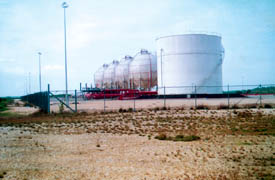Lanka adopts strategies to ensure energy security
BY HIRAN H. Senewiratne
SRI LANKA'S economic and social development is extensively dependent
on the provision of energy services. Continuous supply of these energy
services is heavily linked to ensuring energy security both in the short
term as well as in the medium to long term, Director General, Public
Utilities Commission of Sri Lanka Prof. Priyantha Wijayatunga said.
 "Energy security comes in two distinct forms that deals with securing
the continuity of supply at all times and the other involves with
ensuring that the price at which the energy sources are procured is
affordable to the country's economy," Prof. Wijayatunga told the SAARC
Energy Ministers' Forum held in Pakistan recently. "Energy security comes in two distinct forms that deals with securing
the continuity of supply at all times and the other involves with
ensuring that the price at which the energy sources are procured is
affordable to the country's economy," Prof. Wijayatunga told the SAARC
Energy Ministers' Forum held in Pakistan recently.
He said that Sri Lanka being an importer of all its fossil fuel
requirements which form the basis of about 85% of the country's entire
commercial energy supply is vulnerable in both these aspects of energy
security.
On the other hand the major advantage it possesses is that
approximately 50% of its primary energy requirements are based on
non-commercial energy or biomass and about 8% is based on hydropower
resources, he said.
At present energy consumption levels are only 42% of the primary
energy supplies are exposed to factors beyond Sri Lanka's control.
But in the future this situation will change to the disadvantage of
the country with rapid increase in the use of petroleum fuels and
addition of coal into the primary energy equation, he said.
He said that the draft Energy Policy and Strategies of Sri Lanka has
proposed many strategies to ensure energy security in the country.
According to Prof. Wijayatunga the draft proposals have been
considered many aspects including the introduction of fuel diversity in
electricity generation through diversifying into non-oil generation
technologies, e-transport sector through transport systems based on
electricity and other non-oil fuels, promotion of regional cooperation
in the energy sector in different forms.
This also includes establishing a cross-boarder energy transfer links
with neighbouring countries, introduction of energy industry reforms
with the participation of the State and private sector partnership.
He also said that clear separation of policy-making, regulation and
operation of the energy industry to ensure transparency and
accountability and to provide comfort to the investors in the energy
industry.
In addition to the above, special attention will be paid to the
development of the renewable energy sources such as wind power and
biomass based electricity generation, which are largely untapped
resources at present.
Faster exploitation of remaining hydropower potential both at
small-scale as well as medium-scale in collaboration with the private
sector to maintain a strategic share of commercial energy supplies based
on indigenous sources.
Prof. Wijayatunga said the importance of encouraging energy
conservation at all levels from supply to end-user with the escalating
of energy cost.
Vigorous implementation of the oil and gas exploration proposals in
order to ensure that these resources are exploited at an early stage of
economic development when the country is more vulnerable to
externalities, he said.
Many of these suggestions have been made in the Regional Energy
Security study carried out with the assistance of the USAID funded South
Asia Regional Initiative on Energy (SARI/Energy). The recommendations of
this study was presented to the meeting by Prof. Wijayatunga. |

